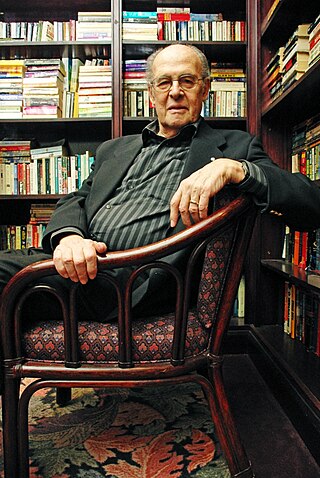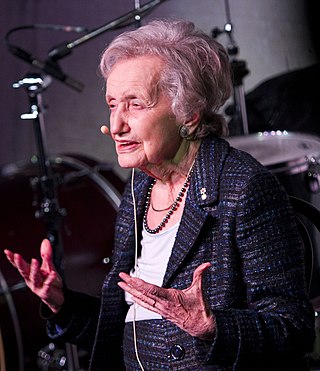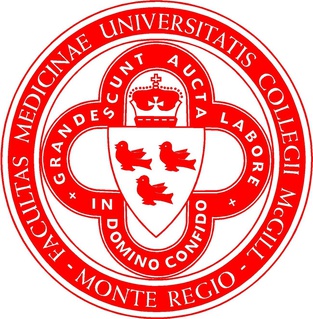Related Research Articles

Ronald Melzack was a Canadian psychologist and professor of psychology at McGill University. In 1965, he and Patrick David Wall revolutionized pain research by introducing the gate control theory of pain. In 1968, Melzack published an extension of the gate control theory, in which he asserted that pain is subjective and multidimensional because several parts of the brain contribute to it at the same time. During the mid-1970s, he developed the McGill Pain Questionnaire and became a founding member of the International Association for the Study of Pain. He also became the founding editor of Wall & Melzack's Textbook of Pain

Brenda Milner is a British-Canadian neuropsychologist who has contributed extensively to the research literature on various topics in the field of clinical neuropsychology. Milner is a professor in the Department of Neurology and Neurosurgery at McGill University and a professor of Psychology at the Montreal Neurological Institute. As of 2020, she holds more than 25 honorary degrees and she continued to work in her nineties. Her current work covers many aspects of neuropsychology including her lifelong interest in the involvement of the temporal lobes in episodic memory. She is sometimes referred to as the founder of neuropsychology and has been essential in its development. She received the Balzan Prize for Cognitive Neuroscience in 2009, and the Kavli Prize in Neuroscience, together with John O'Keefe, and Marcus E. Raichle, in 2014. She turned 100 in July 2018 and at the time was still overseeing the work of researchers.

The Faculty of Medicine and Health Sciences is one of the constituent faculties of McGill University. It was established in 1829 after the Montreal Medical Institution was incorporated into McGill College as the college's first faculty; it was the first medical faculty to be established in Canada. The Faculty awarded McGill's first degree, and Canada's first medical degree to William Leslie Logie in 1833.
Harold Randall Griffith was a Canadian anesthesiologist and a leader in the fields of anesthesiology.
Expenditures by Canadian universities on scientific research and development accounted for about 40% of all spending on scientific research and development in Canada in 2006.
Mustafa al’Absi, Ph.D. is a Professor of Behavioral Medicine and the holder of the Max & Mary La Due Pickworth Chair at University of Minnesota Medical School. Dr. al'Absi also holds faculty positions at Department of Family Medicine, Department of Biomedical Sciences, Department of Neurosciences, and the Integrated Biological Science Program. He is the founding director of the Duluth Medical Research Institute (DMRI), the Behavioral Medicine Laboratories, and the Khat Research Program (KRP). Dr. al’Absi completed his undergraduate education at Cairo University and his doctoral training at the University of Oklahoma in biological psychology with specialization in clinical psychology and behavioral medicine.
Neurosurgical anesthesiology, neuroanesthesiology, or neurological anesthesiology is a subspecialty of anesthesiology devoted to the total perioperative care of patients before, during, and after neurological surgeries, including surgeries of the central (CNS) and peripheral nervous systems (PNS). The field has undergone extensive development since the 1960s correlating with the ability to measure intracranial pressure (ICP), cerebral blood flow (CBF), and cerebral metabolic rate (CMR).
Clinical neuroscience is a branch of neuroscience that focuses on the scientific study of fundamental mechanisms that underlie diseases and disorders of the brain and central nervous system. It seeks to develop new ways of conceptualizing and diagnosing such disorders and ultimately of developing novel treatments.

Sean C. Mackey is an American scientist, anesthesiologist and pain medicine specialist. Since 2012, he has served as the Redlich Professor of Anesthesiology, Perioperative and Pain Medicine, Neurosciences and Neurology at Stanford University. He has been the Chief of the Division of Pain Medicine since 2007 and the Director and Founder of the Systems Neuroscience and Pain Laboratory (SNAPL) since 2002. Previously, he practiced anesthesiology and co-founded Stanford's regional anesthesia program in 2000.
Yves De Koninck, FCAHS, FRSC, is a neuroscientist and Professor of Psychiatry and Neuroscience at Université Laval and Adjunct Professor of Pharmacology and Therapeutics at McGill University.
Edward S. Ruthazer is a Canadian neuroscientist and professor at McGill University in Montreal, Quebec.

Alan Charles Evans PhD FRSC FCAHS is a Welsh-born Canadian neuroscientist who is a James McGill Professor of Neurology and Neurosurgery, Psychiatry and Biomedical Engineering, and holds the Victor Dahdaleh Chair in Neurosciences at McGill University. He is also a researcher at the McConnell Brain Imaging Centre of the Montreal Neurological Institute, Co-Director of the Ludmer Centre for Neuroinformatics and Mental Health, Director of the McGill Centre for Integrative Neuroscience, Scientific Director of the Canadian Open Neuroscience Platform, Scientific Director of McGill's Healthy Brains, Healthy Lives program and Principal Investigator of CBRAIN, an initiative aiming to integrate Canadian neuroscience data with the Compute Canada computing network. He is recognized for his research on brain mapping, and was a co-founder of both the International Consortium for Brain Mapping and the Organization for Human Brain Mapping.
Hans H. Zingg is a Professor Emeritus in the Department of Pharmacology and Therapeutics and Wyeth-Ayerst Chair in Women’s Health at McGill University in Montreal, Quebec, Canada.
Olivier Beauchet is a physician, Professor of Medicine, and Joseph Kaufman Chair in Geriatric Medicine at McGill University in Montreal, Quebec, Canada. He was also appointed Director of the Centre of Excellence on Longevity at McGill University and is a senior investigator at the Lady Davis Institute for Medical Research.
Rosemary C. Bagot is a Canadian neuroscientist who researches the mechanisms of altered brain function in depression. She is an assistant professor in behavioral neuroscience in the Department of Psychology at McGill University in Montreal, Canada. Her focus in behavioral neuroscience is on understanding the mechanisms of altered brain circuit function in depression. Employing a multidisciplinary approach, Bagot investigates why only some people who experience stress become depressed.
Patrick Lee Purdon, Ph.D., is an American biomedical engineer whose research focuses on neuroscience, neuroengineering, and clinical applications. He holds the Nathaniel M. Sims Endowed Chair in Anesthesia Innovation and Bioengineering at Massachusetts General Hospital and is an associate professor of anaesthesia at Harvard Medical School. Dr. Purdon received his Ph.D. in biomedical engineering from Massachusetts Institute of Technology in 2005. His research in neuroengineering encompasses the mechanisms of anesthesia, Alzheimer’s disease and brain health, anesthesia and the developing brain, neural signal processing, and the development of novel technologies for brain monitoring. He has published over 90 peer-reviewed publications, is an inventor on 16 pending patents, and is a Fellow of the American Institute for Medical and Biological Engineering. Dr. Purdon has won many awards, including the prestigious National Institutes of Health Director’s New Innovator Award, and his work has been covered in the popular media, including programs on Radiolab and NPR.
Maria Natashini "Natasha" Rajah is a Canadian neuroscientist who is a Full Professor at the Department of Psychiatry, McGill University, and was the inaugural Director of the Cerebral Imaging Center (CIC) at the Douglas Research Centre from 2011-2021. She is a cognitive neuroscientist who is interested in episodic memory, ageing and dementia. Her research uses functional magnetic resonance imaging to investigate how sex, gender, and social determinants of health interact with age and affect the neural networks responsible for episodic memory encoding and retrieval.

Joel D. Katz is a Canadian psychologist and researcher. He is a Distinguished Research Professor and Canada Research Chair in Health Psychology at York University. He also serves as the research director of the pain research unit in the Department of Anesthesia and pain management at the Toronto General Hospital in addition to serving as a professor in the Department of Anesthesia at the University of Toronto.

Lauren Y. Atlas is an American psychologist researching how expectations and learning influence pain and emotion, and how these factors influence clinical outcomes. She is a clinical investigator at the National Center for Complementary and Integrative Health and serves as the chief of the section on affective neuroscience and pain.
Caroline Palmer is the Canada Research Chair in Cognitive Neuroscience of Performance and Professor in the Department of Psychology at McGill University in Montreal, Canada. She is also an Associate Faculty Member in the Schulich School of Music at McGill. Her research in cognitive science addresses the behavioural and neural foundations that make it possible for people to produce auditory sequences such as playing a musical instrument or speaking. Palmer has developed and empirically tested computational models of how people perceive and produce auditory sequences, and how they coordinate their actions with others.
References
- 1 2 3 4 5 6 7 8 "Terence J. Coderre". Department of Anesthesia. McGill University. Retrieved 7 February 2019.
- 1 2 "Named/Endowed Chair Appointments at McGill University". Office of the Provost and Vice-Principal (Academic). McGill University. Retrieved 7 February 2019.
- 1 2 "Terence Coderre, M.Sc., PhD". McGill University Health Centre Research Institute. McGill University Health Centre. Retrieved 7 February 2019.